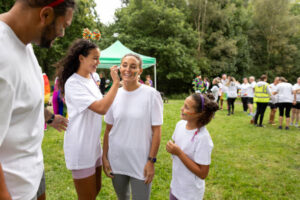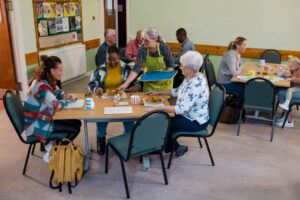It’s Mental Health Awareness Week in the UK, and this year the vital campaign is focused on the power and importance of community.
 Led by the Mental Health Foundation, Mental Health Awareness Week 2025 (12th-18th May) aims to bring the UK together to boost mental health for all and highlight how being part of a safe, positive community and fostering strong connections can significantly improve our wellbeing.
Led by the Mental Health Foundation, Mental Health Awareness Week 2025 (12th-18th May) aims to bring the UK together to boost mental health for all and highlight how being part of a safe, positive community and fostering strong connections can significantly improve our wellbeing.
The leading mental health charity, which has been the home of Mental Health Awareness Week since 2001, says the theme of ‘community’ was chosen because this “sense of belonging, safety, support in hard times” can make us all feel less alone and “give us a sense of purpose.”
Alexa Charnley, Director of Fundraising and Communications at the Mental Health Foundation, explains:
“We know that being part of a community is vital for our mental health and wellbeing. We thrive when we have strong connections with others and supportive communities around us.
“We also know that people who are more socially connected to family, friends, or their community are happier, physically healthier, and live longer, with fewer mental health problems than people who are less well connected.”
Get involved in Mental Health Awareness Week 2025
 Throughout this week, the Mental Health Foundation is providing expert information and advice about how communities can support positive mental health.
Throughout this week, the Mental Health Foundation is providing expert information and advice about how communities can support positive mental health.
Their resources include ideas for cultivating mentally healthy communities, inspiring true stories from diverse UK communities and suggestions for how organisations and individuals can get involved in Mental Health Awareness Week 2025.
You can also donate to help communities across the UK remain spaces of safety, care and support.
Individuals can also purchase a green ribbon pin to show their support for Mental Health Awareness Week and good mental health for all.
 Since its inception 24 years ago, Mental Health Awareness Week has fought to tackle stigma and help everyone better understand mental health. It aims to encourage us all to prioritise our mental health and wellbeing, and that of others.
Since its inception 24 years ago, Mental Health Awareness Week has fought to tackle stigma and help everyone better understand mental health. It aims to encourage us all to prioritise our mental health and wellbeing, and that of others.
For the Mental Health Foundation, one of its key successes is that it keeps mental health at the centre of the public conversation, helping to drive policy changes and ensure everyone knows more about preventing mental health problems and supporting good mental health.
The connection between community and mental health
In an increasingly polarised society, there are many important reasons why the charity has selected ‘community’ as the theme for Mental Health Awareness Week this year.
They outline 7 key ways in which the power of community can help boost our mental wellbeing:
- Social connections reduce isolation. Long-term loneliness increases the risk of someone experiencing mental health problems like anxiety and depression. But regular social interactions make us feel less isolated and protect our mental health.
- Community creates a sense of belonging. We have an innate need to belong. Forging strong connections in our community helps us feel that we belong, which boosts our mood and, in turn, can reduce our heartrate and make us feel less stressed.
- Community involvement brings a sense of purpose. Taking part in community activities can build self-esteem, increase confidence and boost wellbeing. This, in turn, reduces our risk of experiencing anxiety and depression.
-
People with strong social networks experience less stress and fewer mental health problems. Its suggested this is
 because community support helps people manage symptoms of mental health issues and feel less alone, as well as protecting us against mental health problems in the first place.
because community support helps people manage symptoms of mental health issues and feel less alone, as well as protecting us against mental health problems in the first place. - Community involvement boosts life satisfaction. People with strong connections to their community tend to feel more satisfied and happier overall. Parents in particular feel more satisfied and confident in their parenting role when they build strong support networks.
- Strong community ties help us navigate difficult times. Being part of a community can help people cope with stressful situations and life events.
- Communities boost the health and happiness of higher risk groups. People who are at higher risk of poor mental health, such as individuals with long-term health conditions, parents, or young adults, benefit from strong social networks, as these reduce isolation, boost confidence and provide support. This can help to prevent mental health issues.
Build connections this Mental Health Awareness Week
Despite these clear benefits, in our fast-paced modern world, building meaningful connections can often feel difficult. That’s why the Mental Health Foundation also provides 10 top tips for getting involved in your community.
- Make it fun – join a club, sports or activity group that matches your interests.
-
Get outdoors – going for walks, joining running or cycling groups or spending time in a community garden can open you up to social
 interactions and improve your physical health.
interactions and improve your physical health. - Find like-minded people. Look out for groups that align with your interests, beliefs, faith or values. But remember that connecting with a variety of people can also boost wellbeing by helping you learn and grow.
- Show kindness to others. Extend small acts of kindness and friendly gestures to neighbours or people in local spaces to help make connections and spread positivity.
- Show your appreciation. Giving compliments and saying thanks can help to form and strengthen bonds.
- Become part of an online community. Positive, healthy online communities can provide valuable connections and a sense of belonging for those who struggle to socialise in person. Just be sure the community promotes feelings of safety and connection and aligns with your values. You can find safety tips here.
-
Volunteer or donate to charity. Helping others can build a sense of community while providing you with purpose, lowering your stress and boosting your happiness.

- Care for your local community. Participating in litter pick-ups, community gardening or other local events can help you meet new people and feel more connected.
- Welcome new members to your community. Introduce yourself to newcomers, invite new people to community events and provide local recommendations.
- Find peer support groups if you’re struggling. These groups can provide comfort and reassurance, and help to reduce loneliness and isolation.
Investing in communities is ‘the smart choice’
The Mental Health Foundation are also extending an urgent call-to-action to policymakers this Mental Health Awareness Week.
Oliver Chantler, Head of Policy and Public Affairs at the charity, explains:
“When communities falter, people feel isolated and unsupported, especially during life’s toughest moments. We’ve seen this erosion fuelled by poverty, inequality and systemic injustices like racism and sexism. The impact is huge – poor mental health is now the largest single contributor to ill-health across the UK. It’s not just about wellbeing; it has economic consequences, too, with economic and social costs of at least £118 billion every year.”
In a recent blog post on the Mental Health Foundation’s website, Oliver says that governments must “step up and take action to tackle the erosion of our communities and support the public’s mental health.”
He adds:
“This isn’t something governments can afford to ignore. Investing in communities isn’t just the right thing to do morally – it’s the smart choice, too. It helps address the root causes of poor mental health, like inadequate housing, lack of opportunities, and social inequality.
“At the Mental Health Foundation, we’ve been calling for a cross-government plan to prevent mental health problems for many years. This was announced – and then dropped again – but the previous government. There is a huge opportunity for the current government to revive this work.
“Such a plan would look at how every government department can play its part in improving the nation’s mental health, moving to a truly preventative system where parts of government as diverse as Work and Pensions, Education and the Home Office are all thinking about what they can do build a mentally healthy society.
“A fundamental part of that is building our communities back up. When people have access to community assets like youth clubs and leisure centres; when they live in decent housing with local amenities; when thought has been given to preventing loneliness, people are both healthier and more productive. Such work needs to include all members of our society, whether that be asylum seekers, homeless people, people who have been involved in the criminal justice system, or other groups who are too often overlooked when we think about community.
“This sort of cross-government approach to rebuilding our communities would support good mental health but also the economy, helping to make a big dent in the £118 billion a year we pay as a country for the consequences of poor mental health.”
Improve education this Mental Health Awareness Week
 First Response Training (FRT) is a leading national training provider delivering courses in subjects such as health and safety, first aid, fire safety, manual handling, food safety, mental health, health and social care and more.
First Response Training (FRT) is a leading national training provider delivering courses in subjects such as health and safety, first aid, fire safety, manual handling, food safety, mental health, health and social care and more.
An accredited Mindful Employer themselves, FRT’s specialist mental health training courses include Understanding Mental Health, Mental Health Awareness in the Workplace, Managing Stress, Anxiety and Phobias Awareness, Self-Harm Awareness and Suicide Awareness.
They can also provide qualified, approved trainers to deliver accredited Mental Health First Aid (MHFA) training courses, including the Adult, Youth and Lite versions.
A trainer from FRT says:
“Mental Health Awareness Week is a vital annual campaign which helps to raise awareness of common mental health problems and tools we can all use to support our mental health and wellbeing.
“It helps bring mental health to the forefront of conversations across the nation and helps us to focus on our mental health, how we are really doing and what support we might need. This year’s theme really highlights the pivotal role of community support.
“It’s really important that we all have an understanding of mental health problems and an awareness of common conditions such as anxiety, and that we are familiar with effective support strategies for helping others and managing our own mental wellbeing. Building strong social connections and participating actively in our community can help us to build our resilience and significantly improve our mental health.
“FRT’s mental health training provides learners with an understanding of mental health disorders, how they can be managed and treated, how to promote good mental health in ourselves and how to offer support to someone dealing with poor mental health.”
Helpful mental health resources
 A brief summary of our mental health training can now be downloaded as an infographic.
A brief summary of our mental health training can now be downloaded as an infographic.
We also have a number of other free infographics available to download which provide simple tips for helping to manage your mental wellbeing. These include:
- Managing Stress at Work
- Manage Your Stress at Work
- Manage Your Stress
- Support Your Mental Health
- Connect With Nature
- Work Well From Home
- Anxiety Factsheet
- Manage Your Anxiety
- Managing Panic Attack
 You can also download our free Guide to Mental Health Training from our website.
You can also download our free Guide to Mental Health Training from our website.
For more information on the training that FRT can provide, please call them today on freephone 0800 310 2300 or send an e-mail to info@firstresponsetraining.com.

 because community support helps people manage symptoms of mental health issues and feel less alone, as well as protecting us against mental health problems in the first place.
because community support helps people manage symptoms of mental health issues and feel less alone, as well as protecting us against mental health problems in the first place. interactions and improve your physical health.
interactions and improve your physical health.